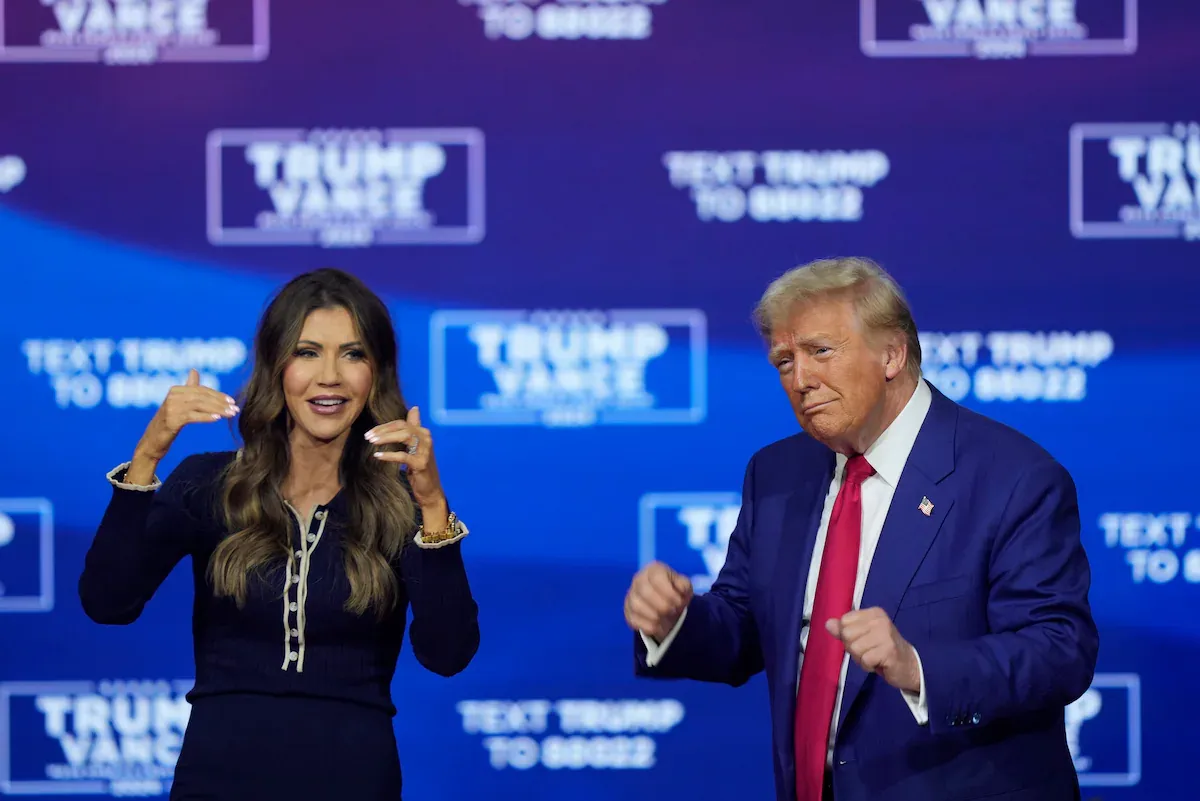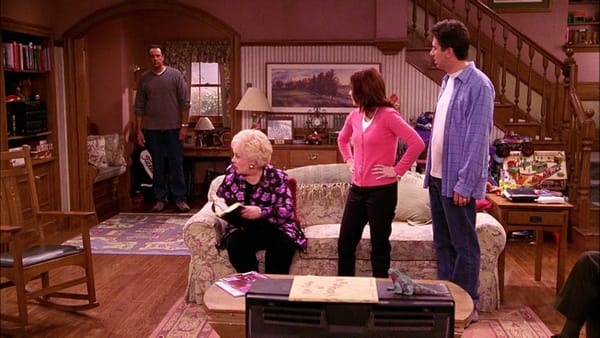Politics is our monoculture now
And it sucks.

Writer Abraham Josephine Riesman recently braved the podcast of WWE legend The Undertaker because the wrestler was interviewing former president (and current Republican nominee) Donald Trump.
Riesman, whose Vince McMahon biography Ringmaster is a must-read to understand our current politics, has been arguing for a while that Trump's understanding of elections is fundamentally rooted in wrestling. On July 22, in the immediate wake of Joe Biden bowing out of his re-election campaign in favor of Vice President Kamala Harris, Riesman observed the following of Trump: "What you have to understand is Trump thinks of elections as pro wrestling feuds, and any wrestler would be mad if the promoter booked him with a new opponent at the last minute before WrestleMania."
Then, on The Undertaker's podcast (pause to acknowledge how ridiculous our reality is), Trump more or less repeated Riesman's thesis verbatim, something she pointed out on Bluesky. Trump said:
They took it away! Now think of me [...] It was a good debate, [Biden] goes down and now I have to fight somebody else? That's like you going into the ring, and you're beating the hell outta somebody, and they call up and say, "Get that guy outta the ring. We'll put somebody else in for a while." Now, you gotta fight two guys instead of one. [...] You think you have it won, and all of a sudden, they're replaced!
Obviously, yes, it's not great that one of the two major party's nominees for president this year seems to perceive much of his life via the metaphor of professional wrestling. And yet I don't know that how Trump thinks about these matters is so dissimilar from how lots of Americans think about our politics. The end result of 40-plus years of neoliberal economics and various reactions to those policies has been a sense that the federal government mostly exists on TV for our entertainment.
As recently as ten years ago, it was much easier to tune the political noise out because our shaky but still existent monoculture had other things to talk about. That allowed politics to maintain one toe in the world of the real, with the other nine in the world of the increasingly surreal. Yet in 2024, politics is our monoculture, and it has only accelerated a sense that most of what is happening in our capital is distant, unknowable, and perhaps even fictional on some level.
Consider becoming a paid subscriber: For as little as $5 a month, you can support this newsletter and help keep it rolling. Paid subscribers get a weekly post on Fridays that goes out even on weeks the Wednesday newsletter is dark, access to the full archives, a monthly mailbag, and a link to the Episodes Discord server. There will be some other fun treats along the way. (In the new year, for instance, I'm planning on doing a weekly watch-along in the Discord. I'm still deciding on the show.) Click the button to learn more!
I don't want to pretend this is an entirely new phenomenon. Confusing the very real stakes of American politics for the much less present stakes of then-current pop culture is a pastime as old as American politics. For instance, a huge part of Ronald Reagan's rise was his ability to more or less present a variation on some of his best-known film characters. If you were paying attention to the 2016 presidential election (and I'm so, so sorry for you if you were), then you surely remember the fleet of "presidential candidates as Game of Thrones characters" posts. And lest I pretend to be above it all, I wrote about the yet-to-be-called swing states in the 2020 presidential election as though they were plots in a prestige TV drama.
Some of this is a healthy way to joke obliquely about living in a country where it feels like your politicians have so little connection to your life that they might as well be fictional characters. Unless you live in a small town where you can harangue your mayor regularly, a certain amount of detachment from your leaders is surely inevitable, and the most successful politicians find a way to lean into this just a little bit. As I argued in my old Vox podcast Primetime (which is under my former name), Reagan and Barack Obama's skill at playing themselves on TV – effectively fictionalizing themselves just a little bit – was a significant part of why they were both able to knit together such broad electoral coalitions.
What's shifted across the last two elections is that the monoculture outside of the world of politics has completely and utterly splintered. There are occasional mega-events in the world of pop culture that briefly make it seem as though the monoculture has returned – Barbenheimer, the Eras Tour, etc. – but for the most part, the "characters" we get the most exposure to at the moment are Donald Trump and Kamala Harris, and the ways in which increasing numbers of us relate to them stem from how we might be fans or anti-fans of characters on our favorite TV show.
The explosion of memes and TikTok energy around Harris when she entered the race in late July largely stemmed from the fact that something new was finally happening in what had to that point been a grimly inevitable 2020 rematch, which is to say people acted as though Harris was less politician than exciting plot twist. Biden's exit from the race only underlines this point further. Yes, he continues to occasionally pop up in the news, but when he does, he always feels like he's just a normal old man who happens to be the president. For me, at least, there's often an air of, "Oh, yeah, he's still the president!"
What's more, the Whac-a-mole nature of how Harris and Trump are campaigning – popping up on podcasts and streams and other weird platforms, instead of more traditional journalistic enterprises – only further underscores the ways in which we relate to them as "fictional" characters. Harris's appearance on Call Her Daddy and her Fox News interview were similarly skillful examples of a politician attempting to reach an audience who might not normally hear from them; they also had the strange feel of someone doing the press circuit for a new movie or TV show they were in. (This increasingly diffuse method of campaigning also suggests our political monoculture is similarly fraying, if a bit more slowly than our pop culture monoculture did.)
And yet for all that Harris and Biden have been prisoners of this dynamic, there is one man who has ridden it right to the top – and might do so again.
Yes, now the article is about Donald Trump
This sense of presidential politics as our last monocultural monolith has unquestionably helped Donald Trump more than any other politician. He is, after all, an entertainer first and foremost, and he has an inherent, intuitive understanding of how to manipulate TV to his advantage. (I would say he has gotten considerably worse at this every year of his political career, but it's not like his skills have atrophied entirely.) Is he wandering around on stage for 39 minutes, listening to music? Well, what you have to understand is that he was on The Apprentice! He knows business stuff!

This quality means that the man can do effectively anything and be understood by some group of his supporters in the fashion that is most entertaining or beneficial to them. That idea more than comes through in this New York Times article about Trump supporters who fundamentally don't believe he will try to achieve any of his campaign promises.
For too many of these supporters, Trump picks targets to yell at – racial minorities, immigrants, trans people, women, take your pick – in a way they find invigorating and entertaining. Yes, a significant portion of those voters do hope Trump will follow through on his threats. Yet plenty of others (as seen in the Times article) might largely agree with Trump on a rhetorical basis but would rather not see, say, the country undertake mass deportations, for any number of reasons. In a close election, some portion of those voters peeling off to vote for Harris because they think Trump might actually do what he says could prove decisive. Instead, they seem to think of him as a buffoon on the TV, not unlike the way audiences reacted to Archie Bunker. But Archie didn't ever get his hands on the nuclear football.
Politicians who've run against Trump from both parties are hamstrung by this sense of Trump as a larger-than-life entertainer. Ron DeSantis would likely be more effective at running a fascist government than the endlessly distractible Trump, but DeSantis has to play by conventional rules in a way Trump does not, something that sank Meatball Ron's presidential campaign even before it began. And don't get me started on Hillary Clinton's utter vexation with trying to find a way to circumvent Trump's ability to play the "you love to hate him" reality show heavy to a T.
If anything gives me some hope for a way out of this trap, it's that the Trump of 2024 is visibly not the Trump of 2016, and that fact seems to be seeping into the electorate more and more. If you could vote on the cast of your favorite TV show, after all, you probably wouldn't want to bring back a character who maybe had some juice at one time but is visibly less entertaining now. No matter how much Trump surrogates real and imagined prop him up, he cannot escape the fact that he is yesterday's news in this election.
Yet this is also an election that is very, very close, which means anything might happen. Yesterday's news might prove to be just comforting enough to just enough people to win. There is a fair degree of (justified) alarmism around this happening, and as a trans person, I would really rather not live in a country where I could quickly be deemed undesirable with a stroke of a pen. And if Trump follows through on his plans to instate massive tariffs, we all might get to share in the pain. If Trump wins again and even a couple of those worst-case scenarios came to be, I wonder if it would finally put to rest the idea that our politics is the last TV show we're all paying attention to. For all that we might have been obsessed with Game of Thrones, it never set fire to our reality. If we're not careful, our new favorite show just might.
This week's reading music: "I Guess Time Just Makes Fools of Us All" by Father John Misty
The free edition of Episodes, which (usually) covers classic TV and film, is published every other Wednesday, and the subscriber-supportededitionof Episodes, which covers more recent stuff, is published every Friday. It's written by Emily St. James. If you have suggested topics, please reply to the email version of this newsletter or comment (if you are a paid subscriber).





